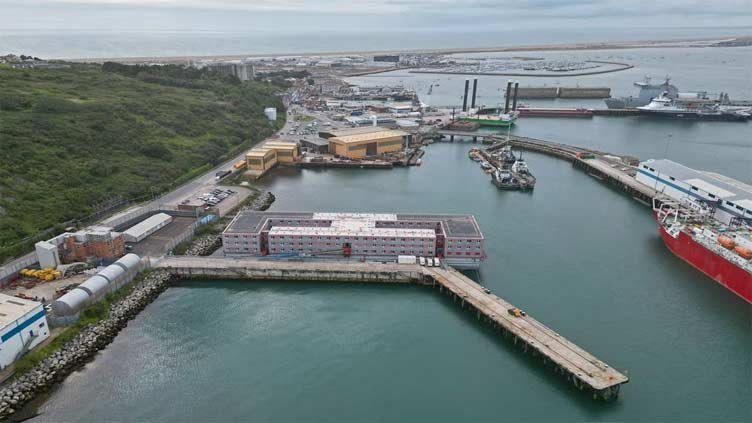By Fatima Basheer
In a surprising twist, Britain is swiftly relocating a group of asylum seekers from a barge, merely days after their transfer, due to the unexpected discovery of Legionella bacteria in the water supply. This development has placed the government in an awkward position as it endeavors to showcase its newly adopted stringent immigration policy.
The orchestrated movement of asylum seekers to the Bibby Stockholm, a substantial vessel anchored off the Dorset coast, was initiated earlier this week as a prominent component of the nation’s strategy to discourage the influx of individuals via small boats. However, even prior to its execution, the policy garnered significant controversy. Government officials cited cost reduction in accommodating asylum seekers as a motivation behind this step. Nonetheless, this action was met with staunch opposition from human rights advocates, who likened the barge to a confinement vessel, deeming its employment as deplorable.
A representative from the Home Office, the country’s interior ministry, disclosed, “Preliminary environmental analyses of the water system aboard the Bibby Stockholm (barge) have revealed the presence of Legionella bacteria at levels necessitating further investigation.” Consequently, as a preventative measure, the 39 asylum seekers who had been transferred onto the vessel this week are now disembarking, pending additional evaluations.
The colossal three-story barge boasts accommodation capacity for approximately 500 individuals, offering over 200 bedrooms. The initial plan had outlined the transfer of more asylum seekers onto the barge in the ensuing weeks. However, this unforeseen bacterial finding has prompted an immediate and cautious response from the authorities.
This incident brings to light the intricate challenges intertwined with the execution of immigration policies that are aimed at curtailing unauthorized arrivals. As the government grapples with the multifaceted intricacies of managing such a policy, it underscores the necessity of meticulous planning and preparedness to ensure the well-being and safety of those affected. In the broader context, the incident has ignited fresh debates regarding the ethical implications of employing unconventional accommodations for vulnerable individuals seeking refuge. This episode serves as a stark reminder that comprehensive oversight and accountability are essential components when implementing policies with far-reaching consequences.
An uninvited guest in the form of Legionella bacteria has been uncovered in the water supply, casting a shadow of concern as it holds the potential to induce Legionnaires’ disease, a respiratory infection characterized by its rarity but grave impact, as emphasized by the British health service.
Notably, no individual aboard has displayed any symptoms of the disease, and the government is in close coordination with the UK Health Security Agency (UKHSA), meticulously adhering to their guidance and recommendations in this regard.
Prime Minister Rishi Sunak’s administration has been active throughout the week, rolling out various measures aimed at diminishing the influx of asylum seekers. This strategic approach is undertaken with the hope of garnering support from the electorate, especially considering the Conservative Party’s trailing position in the ongoing opinion polls.
Sunak, underscoring his government’s commitment to tackling illegal immigration, has firmly positioned it as one of his principal objectives. He holds the aspiration that a reduction in the number of arrivals could potentially tip the scales in his party’s favor, resulting in an unforeseen victory during the forthcoming national election.
In response, the opposition Labour Party voiced their perspective, stating, “The Conservatives may present slogans and gimmicks, but they lack substantive solutions.” This sentiment underscores the notion that mere rhetoric without concrete actions holds little significance in addressing complex challenges such as immigration management.
Subscribe our website for latest updates:
https://republicpolicy.com/shop/
Read More
















